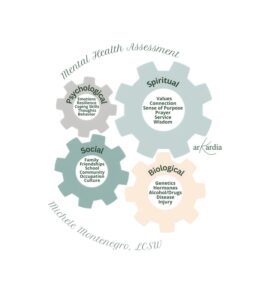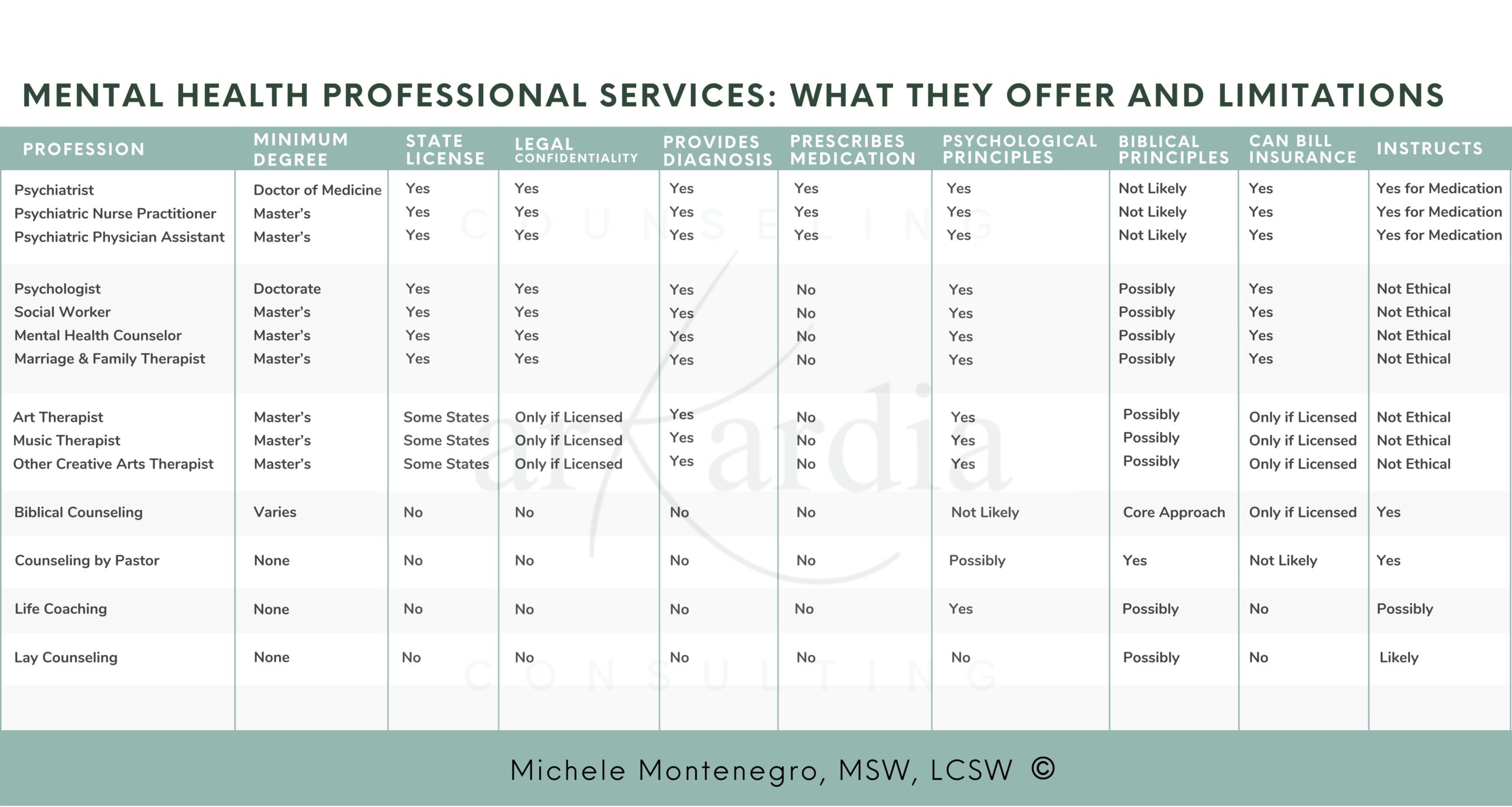8 Essential Keys to Finding the Right Faith-Based Therapist for Your Healing Journey
Choosing the right faith-based therapist or counselor is one of the most important decisions you can make for your emotional health and personal growth. Whether you’re struggling with stress, anxiety, depression, relationship issues, or seeking deeper self-understanding, the right professional can make all the difference in your healing journey. And if your Christian faith is an integral part of your life, it’s especially important to find a helper who respects and thoughtfully integrates those beliefs into the process.
This guide will help you reflect on your needs, understand what to look for, and confidently choose a counselor or therapist who aligns with your values and goals. It can be discouraging—and sometimes painful—when you think you’ve found the right person, but they just miss the mark. So, read on and refer to the table, “Mental Health Professional Services: What They Offer and Limitations,” to explore who might be the best fit for you—both emotionally and spiritually.
1. Clarify Your Therapy Goals: Know What You’re Looking For
Before beginning your search, it’s important to reflect on your goals for therapy. Getting clear on what you need will help you find a professional who can offer the right kind of support.
Here are some helpful questions to ask yourself:
- What challenges am I currently facing (e.g., anxiety, trauma, spiritual dryness)?
- Am I interested in short-term support or long-term healing?
- Do I want my Christian faith integrated into the therapeutic process?
- Would I be open to medication, if recommended?
- Am I seeking healing from past wounds, clarity on next steps, or support through a specific season?
Knowing the answers to these questions will give you clarity on what matters most and help guide you toward a professional who can offer the support and tools you need to move forward.
2. Why Choosing a Faith-Based Therapist Matters
One of the unique aspects of faith-based counseling is that it integrates your spiritual life into the therapeutic process. Faith-based counseling doesn’t mean you’ll be preached at—it means your faith can be woven into the therapeutic process in ways that feel authentic by incorporating prayer, Scripture, or simply maintaining a Christian worldview.
Some questions to consider:
- Does this therapist openly identify as a Christian or faith-based counselor?
- How do they incorporate faith into their sessions?
- Are they open to discussing spiritual concerns alongside emotional ones?
The right faith-based counselor will create a space where your faith isn’t just acknowledged—it’s seen as a powerful source of strength and resilience.
3. Finding a Faith-Based Therapist Who Truly Listens
True healing happens when a therapist sees you as a whole person—not just a set of symptoms. A skilled Christian counselor will listen deeply, hold space for your pain, and help you explore the emotional and spiritual roots of what you’re experiencing.
A faith-based therapist who listens deeply can help you: 
- Understand how your spiritual life intersects with your emotional health
- Identify patterns that keep you stuck
- Reconnect with God’s truth and grace as part of your healing
If you’ve been carrying emotional burdens for a while—this is where a licensed clinician who understands advanced therapeutic techniques will be beneficial vs. lay counseling, pastoral care or Biblical counseling. Licensed therapists are trained in deeper work like trauma, EMDR Therapy, Attachment issues and/or inner healing approaches that align with Christian principles.
4. Consider the Therapist’s Style, Specialties and Approach
Therapists use different methods and approaches to help clients, so it’s important to find someone whose style aligns with your personality, values and goals.
Think about what would feel most helpful to you:
- Do I want a therapist who’s more structured and solution-focused or someone who’s rooted in scripture?
- Am I drawn to someone who creates space for contemplative practices, prayer, or reflection?
- Do I need a therapist who integrates humor into the healing process? A little laughter can sometimes provide the relief you need to work through difficult emotions and build a strong therapeutic relationship.
- Do I feel seen not just for my struggles, but for my values and identity in Christ?
It’s important to choose someone whose approach resonates with you. If you’re not sure, many faith-based therapists offer initial consultations to help you determine if their style fits your needs.
5. Finding the Right Therapeutic Environment for You
Healing happens best in an environment where you feel safe, respected, comfortable and spiritually supported. Some might  think that a space is superficial, but it can make a difference.
think that a space is superficial, but it can make a difference.
 Here are some factors to consider:
Here are some factors to consider:
- Do I prefer in-person sessions or the convenience of virtual therapy?
- Does the space feel peaceful, clean, and inviting?
- Is the space free of clutter and calming?
- Are there thoughtful touches, like tea or water, that create a sense of care?
- Does the environment reflect faith-based values in subtle or meaningful ways?
Even small details can make a big difference in helping you feel comfortable and open during sessions.
6. Evaluate the Fit: It’s Okay to Take Your Time
When you get right down to it, choosing a therapist is a personal decision, and it’s important to trust your instincts. In fact, some research suggests that the therapeutic relationship potentially contributes up to 60% to the therapy’s success. So, while credentials and experience matter, the most important factor is how you feel in the room with them.
Here’s a few tips to evaluate the fit:
🌟 Connection and Comfort
Do you feel heard, understood, and respected—especially in your faith? Your beliefs should be respected even if you come from different denominations or backgrounds. You want a space where you can be honest about your pain, wrestle with questions of faith, and celebrate your growth—all without fear of judgment.
🌟 Clinical Expertise
Does the therapist or counselor have training in the areas you want to work on—such as trauma, anxiety, or relationship issues? Make sure they are knowledgeable about your specific concerns and can offer you the tools and strategies that will be most helpful for your situation. There’s no one “right” style.
🌟 Faith Integration
Are they respectful of your beliefs? Some faith-based therapists are Christian in worldview but keep sessions clinically focused unless invited to discuss faith. Others actively bring spiritual practices into the work. Find what feels right for you.
🌟 Trust Your Gut
If something feels “off,” that’s okay. It’s not a reflection on your worth—it just means this may not be the right match. A good therapist will understand and may even help you find someone who’s a better fit.
7. Is Now the Right Time for Therapy?
 You don’t have to be in crisis to start therapy. Many people seek counseling for personal growth, spiritual direction, or simply to have a safe place to process life’s challenges. It can be a transformational and life-changing experience, at any point in time.
You don’t have to be in crisis to start therapy. Many people seek counseling for personal growth, spiritual direction, or simply to have a safe place to process life’s challenges. It can be a transformational and life-changing experience, at any point in time.
You might be ready if:
- You’ve been carrying the same emotional burden for a while and feel stuck.
- You want to explore your identity, faith, or relationships more deeply.
- You want to work on developing healthier coping strategies.
- You’re navigating a betrayal trauma, burnout, spiritual dryness, or a season of grief.
- You’re curious about how your faith can support your mental and emotional healing
Therapy can be weekly, biweekly, or even in an intensive format for those seeking deeper healing in a shorter time. Some people may not feel they are ready for or need therapy, but would like some additional information from a professional. If this is the case, a consultation or coaching may be more appropriate.
8. Taking the Next Step: How to Get Started
There are many ways to find a faith-based therapist who aligns with your needs and beliefs. Here are a few tips:
-
Search online using keywords like “Christian therapist near me” or “faith-based counselor in [your city].” Review their website, so you can get a sense of who they are.
-
Visit Psychology Today and filter by faith, need and speciality.
-
Check with your church. Pastors often have trusted referrals.
-
Ask your doctor or insurance provider for recommendations.
-
Look into local schools or universities if you’re seeking care for a child or teen.
Once you’ve found a few options, schedule a consultation or reach out by email. Before the call, jot down your questions—this will help you feel prepared and confident.
Remember: it’s okay to take your time. You’re not just choosing a therapist—you’re choosing a partner in healing who respects your emotional life and your walk with God.
Ready to Begin Your Healing Journey?
Taking the first step toward therapy can feel vulnerable—but it’s also incredibly courageous. You’re not just seeking help; you’re choosing to invest in your healing, your faith, and your future.
Whether you’re looking for short-term clarity or long-term transformation, the right faith-based therapist can walk beside you as you grow, heal, and become the person God created you to be.
You deserve support that honors your story, your faith, and your unique path.



Thank you for simplifying a really complex decision. Your step-by-step approach and reflective questions are so helpful!